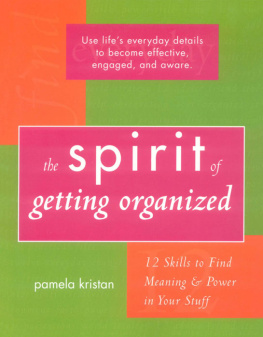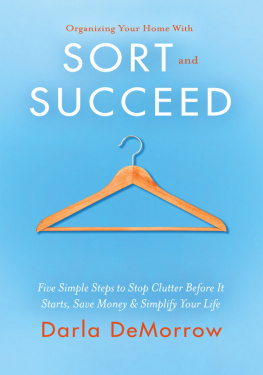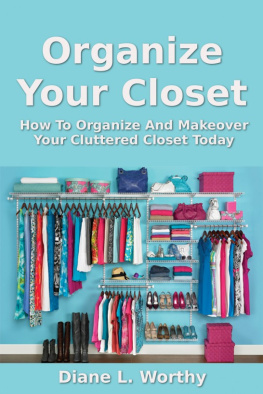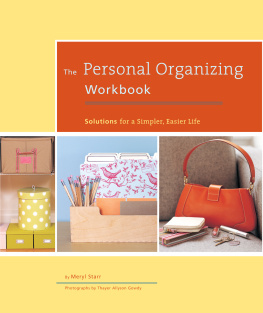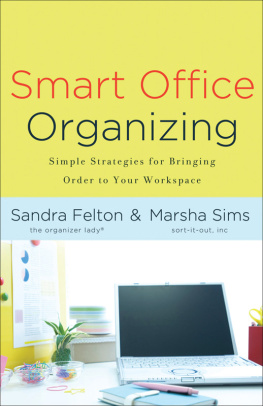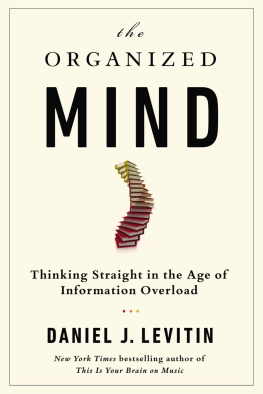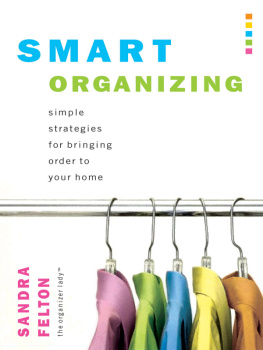
First published in 2003 by
Red Wheel/Weiser, LLC
York Beach, ME
With offices at:
368 Congress Street
Boston, MA 02210
www.redwheelweiser.com
Copyright 2003 Pamela Kristan
All rights reserved. No part of this publication may be reproduced or transmitted in any form or by any means, electronic or mechanical, including photocopying, recording, or by any information storage and retrieval system, without permission in writing from Red Wheel/Weiser, LLC. Reviewers may quote brief passages.
The quote on page 4 from Heather McHugh's unpublished poem is used with her permission.
Library of Congress Cataloging-in-Publication Data
Kristan, Pamela.
The spirit of getting organized : 12 skills to find meaning and power in your stuff / Pamela Kristan.
p. cm.
Includes bibliographical references and index.
ISBN 1-59003-024-9 (PB)
1. Home economics. I. Title.
TX147 .K65 2002
640dc21
2002151580
Typeset in Monotype Garamond by Gopa & Ted2
Printed in Canada
TCP
10 09 08 07 06 05 04
8 7 6 5 4 3
www.redwheelweiser.com
www.redwheelweiser.com/newsletter
Contents
Acknowledgments
As A SPIRITUALLY ORIENTED PERSON and an organization consultant, I've seen how organizing work touches every aspect of life, including the inner (and outer) reaches of philosophical inquiry and the social milieu in which we live. In this book I make such connections explicit. However, I am not by trade a philosopher or a social commentator, and, realize that at times I'm in deep water here. I send you, then, to the work of those who swim in these waters professionally. References to books by those who have influenced me appear in the Resources section.
Intellectual Debts
Jacob Needleman's books Money and the Meaning of Life and Time and the Soul give form to concepts that had been brewing in me for years. My thanks to him, also for leading me to Lewis Hyde's The Gift and Maurice Nicol's Living Time. Thomas Moore's books, Care of the Soul and The Re-enchantment of Everyday Life, gave me similar gifts.
Many other authors influence my worldview in ways that show up here. David Abram and Brian Swimme both hitch paradigm-shifting ways of thinking to simple, intuitive concepts. In The Spell of the Sensuous, Abram uses metaphors of the past, present, and future to explain language; in The Universe Is a Green Dragon, Swimme uses metaphors of the four elements and sky to explain physical law. Susun Weed's wise woman way of fostering what is healthy rather than cutting away what is sick confirms the both/and principle that shows up in this book. Among other outside-the-box authors whose influence appears here are Daniel Quinn, Parker Palmer, and Karla McLaren. Thanks to all, and to the many others whose ways of thinking have contributed over the years.
Gratitude to Those Who've Helped Along the Way
I would like here to express my heartfelt and continuing gratitude to all those who helped, in ways obvious and not so obvious, to bring this work to life. All my clients and class participants: without you this book would not have been written. The book support team: Colleen Sharka, reader and support from the very beginning to the very end; Jim Guinness, always helpful with practicalities, not to mention way-out ideas; Glenn Morrow, expert, sensitive editor; Francine Crystal, tell-it-like-it-is-yet-gently reader; Carolyn Roosevelt, who knows all the right words; brainstorm session folksColleen, Jim, Francine, and Powell Woodward, Maria Judge, Rosemary Weiss, and Barbara Simkowski.
Those in my life who have cared for me when I needed it most: my sister Susan Olvey, Anne Marie Skogsbakken, Marlene Sinkuler, Medora Hearn, Barbara and Bonnie of Phoenix, without whose matter-of-fact, womanly care I might not be here. The Washington County folks who initiated me in Life/Death/Life: first and most deeply influential, Philip Batstone, from whom I learned how to sniff out structure in the surface; artist friends Elizabeth Ostrander and Vicky Southwell; Charlie Brown now gone; and Peter Milford, my muse all these years. Friends with whom I have shared intimately: Jane Hudson; Janet Piggins, who helped midwife my consulting business name, The Practical Matters; Jane Gallagher; Colleen; Jim; Anne Marie; and Christine Watson among them. And deep gratitude to the land that brings me forth and sustains me, especially fields and forests, swamps and rivers, and all the borders between.
Those who have profoundly influenced my spiritual life: Slow Turtle and Tlakaelel (thanks to Pat Connolly for bringing me to them); Paul Rezendes for introducing me to the art of seeing; Ross Jennings and the dowsers; and all the earth-spirituality folks encountered along the way.
Teachers, consultants, and madmen/women who have encouraged, shaped, and challenged me: Michael Steinberg, who brought me out as a writer; Life/Work Direction folks, Eunice &Don Schatz and Dick Faxon; Dan Cherry, who shakes me up homeopathically; Terri Fedrow, Lisa Caselli, Susan Pressman, Mark Weber, Ted Powers, Priscilla Mueller, Margo Mariana, Kurt Leland, Brother Blue, Phil, George Wertke, Walter Gray, and most especially, Tait Sanford Barrows.
Profound thanksto all of you, and to the universe for bringing us together!
Prelude
Meaning and Power in Stuff
WHEN I FIRST STARTED WORKING in personal organization skills, it certainly didn't seem like I was doing anything deeply meaningful or earthshaking. Organizing was just something I could do that people needed. After years in the field, it slowly dawned on me that what I was doing was much more important than I realized. Is getting organized simply a matter of sorting papers, using file folders, and managing time? On one level, it is. And it's so much more.
Organizing can touch the whole of our beingnot only the down-to-earth personal papers, files, and closets, but also the farthest-reaching, grand patterns of Nature. The papers on our desks are connected to the universe, and in fact, are the universe, in part. When we work with them, we work with the cosmos. What happens in the small influences what happens in the large. Getting organized is much more than scut work; it is an encounter with meaning and power.
Organizing also operates on a most intimate, personal level. When we organize soulfully, our particular way of being is reflected in our environment. How we think, how we do what we do, and how we envision ourselves come forward into the world. For example, when we throw things out, we're confronted with the values that tell us what to keep and what to toss. When we rearrange space, we put our stamp on our surroundings so we can effectively engage with the world as we choose. Through organizing we can get to know ourselves in all our fullness.
Organizing calls on our most human talentsperceiving patterns and participating in how those patterns play out. As we sort, we perceive the patterns that give our stuff sense and meaning. As we make changes, we participate in shaping our environment so our power can flow. By exercising these particularly human talents we enliven our souls and take our places as co-creators in the world.
1. Knowing Versus Doing
FOR MOST OF US, organizing seems to be mere drudgerydistasteful, trivial business when compared to the creative, productive, or urgent pursuits we feel called to do. If we see this as an either/or situationeither drudgery or productivityguess which wins out? The important pursuits of our daily lives, not the trivial pursuit of organizing. Yet, when we pursue only productivity, we have nagging anxieties about organizing; when we pursue only organizing, we feel we're missing out on life.
Next page
